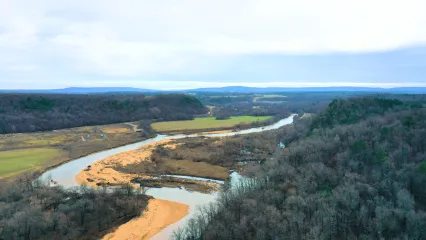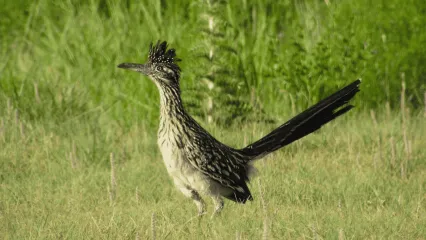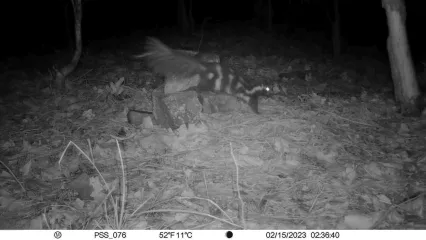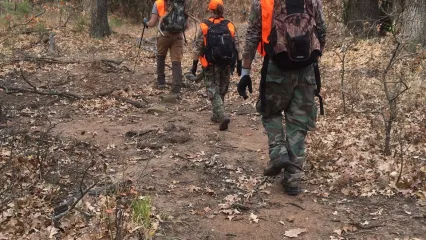Attention Non-Residents
The Oklahoma Wildlife Conservation Commission adopted new rules in 2025 that require non-residents accessing certain Oklahoma public hunting and fishing areas to check in and out of the area. By checking in and out of these areas, hunters, anglers, shooters, birdwatchers, hikers and any other users can help the Wildlife Department better understand how the area is being used. There is no additional cost associated with checking in or out of an area. There is no limit to the number of check ins for an individual in a year.

Contacts
Area Details
Barren Fork WMA consists of approximately 497 acres along the Barren Fork Creek in eastern Adair County and is located approximately 5 miles south of Westville, OK. Over a mile of this Ozark stream lies within the boundary of the WMA. The property consists predominantly of creek bottom habitat and hay meadows and has small sections of oak-hickory forest on the rolling, rocky, and relatively steep hills surrounding the creek. The average annual precipitation is about 41 inches. Area use regulations can be found in the Oklahoma Hunting Guide.
From Westville: 5.0 miles south on Hwy 59, Turn left on E754 Rd for 0.4 miles, Continue straight onto S4725Rd/E0761Rd for 2.0 miles.
- Deer: White-tailed deer present in fair numbers.
- Turkey: Eastern turkey present in low numbers.
- Furbearers: Coyote, bobcat, gray fox, raccoon, skunk, and opossum are found on the area.
- Squirrel: present in fair numbers.
- Rabbit: Cottontail rabbits are available
- Quail: present in low numbers
- Dove: The area has a small grain agricultural field that provides fair to good dove hunting in early season.
- Bald Eagle: Eagles occasionally winter along Barren Fork Creek
Camping is not permitted on the WMA. Accommodations can be found in Stilwell and Westville.
Stilwell Chamber of Commerce
(918) 696-7845
Westville Chamber of Commerce
(918)-723-3243
The Barren Fork Creek provides excellent year around smallmouth fishing, some spotted and largemouth bass, and a variety of sunfish species. For more information about fishing the Barren Fork Creek, consult the Oklahoma Fishing Guide.
Closed Seasons
Same As Statewide Seasons
Seasons w/ Special Restrictions
- Quail
Same as statewide season dates, except closed during the first nine days of deer gun season.
- Pursuit with Hounds for Furbearers
Same as statewide season dates, except closed from opening day of deer archery season through the first 9 days of deer gun season.
- Turkey Spring, Youth Turkey Spring
One-tom limit; seasons combined.
No camping allowed.
Channel and/or blue catfish: six combined per day.
up to two rods and reels per person.
For One Survey Team, “Getting Skunked” Smells Like Success
Getting skunks on camera was a critical first step in an Oklahoma State University survey team’s effort to learn more about the Plains spotted skunk population in southeastern Oklahoma. The secretive and little-known skunk was detected at about half of the survey sites on the Ouachita National Forest.
Apprentice Designation: A Learner's Permit for Hunting
Hunter education has greatly reduced hunting accidents, but if you can’t complete a course right away, the apprentice designation allows you to hunt under supervision. It works like a learner’s permit, giving you the chance to gain real experience safely until you finish hunter education.



